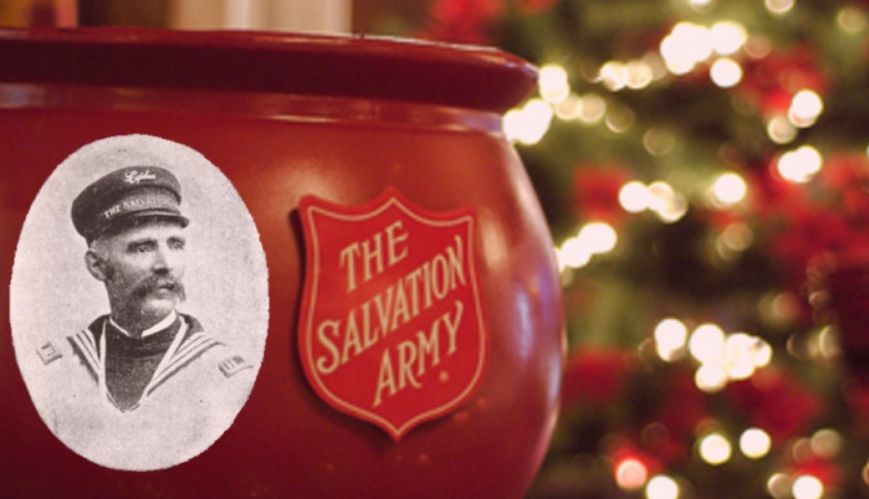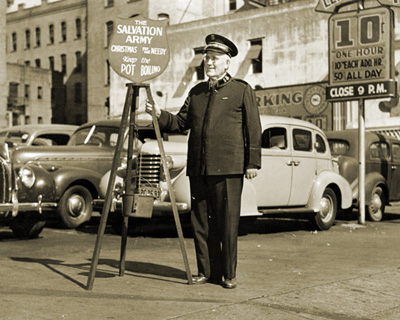Virus takes toll on America's symbol of Christmas

Virus takes toll on America's symbol of Christmas
Little did Captain Joseph McFee know when he used an old pot to collect donations to fund a Christmas dinner for poverty-stricken San Franciscans that The Salvation Army across America still would be using his idea 130 years later. Photos: Southern New England, USA Eastern Territory website.
For the first time in 130 years, The Salvation Army’s iconic end-of-year red kettle and bell-ringing appeal campaign across the United States has begun early in a race against the clock to ‘rescue’ Christmas.
To most Americans, the Army’s ‘red kettle’ is the symbol of Christmas. This year the campaign has been rebranded “Rescue Christmas” and was launched in mid-September, 100 days before 25 December.
Commissioner Kenneth Hodder, National Commander for the Army in the United States, said the effects of the coronavirus pandemic was the reason for the early start. He said more donations were needed because of the significant increase in the number of people struggling after having lost their jobs or on reduced incomes.
The campaign traditionally begins around Thanksgiving, which is at the end of November. Many places across the country where 25,000 red kettles are typically hosted are no longer open, causing significant disruptions to normal fundraising seen during the holidays.
 The Salvation Army Red Kettle campaign has been a quintessential part of Christmas for Americans for more than 100 years.
The Salvation Army Red Kettle campaign has been a quintessential part of Christmas for Americans for more than 100 years.
Captain Joseph McFee is credited with having launched the red kettle idea in San Francisco around 1891. The tradition has spread to other countries including Korea, Japan, Chile and across Europe. The Salvation Army in Australia has also sometimes used a red kettle at Christmas.
Joseph was worried how he would raise enough funds to put on a free Christmas dinner for 1000 of the “destitute and poverty-stricken” of the city, so he placed a pot outside some shops with a sign: ‘Keep the Pot Boiling’ – an idea he derived from his sailor days in Liverpool, England, where there was a large, iron kettle on the docks called ‘Simpson’s Pot’ into which passers-by tossed a coin or two to help the poor. Joseph raised enough to put on the dinner.
While there may be fewer collectors in their red aprons outside stores sprinkled across the US, the focus has shifted to online donations. Along with the effects of COVID-19, the National Commander said the Army realised people now carried less cash. He said many who were regular donors were now “coming to us for help”.
“People are coming to us who could never have imagined they would need the services of The Salvation Army,” Kenneth said.
Major Glen Caddy, Divisional Commander for Western Michigan-Northern Indiana, said red kettle donations could be down more than 50 per cent this year. “Higher need and a bigger challenge for raising funds have really driven us to start early to get people thinking about the fact that people in our communities are going to be in need in a greater way this year than they ever have been,” Glen said. “We’ve been able to keep up with demand until now but Christmas is our biggest fundraising time and with a lower count in stores and all the other challenges, if we don’t meet some of our goals this Christmastime, it will impact our ability to continue to provide services into the future.”
The Army in the US relies on the red kettle campaign for about 70 per cent of its donations. Last year, it raised $US126 million ($A178 million) through the campaign but expect to only realise half that much this year.
Since the COVID-19 pandemic hit the US in March this year, the Army has provided more than 100 million meals across the country, 1.5 million nights of safe shelter, and emotional and spiritual support to more than 800,000 people. It is bracing for a 155 per cent increase in the need for its services heading into the holiday season.
The National Commander said it was expected the average figure of about 2.6 million people assisted each year would grow to more than 6.6 million people this year.
“We want to make sure everyone who comes to The Salvation Army will get what they need, not only for Christmas but to know that there’s hope and that there's a bright future ahead,” Kenneth said.